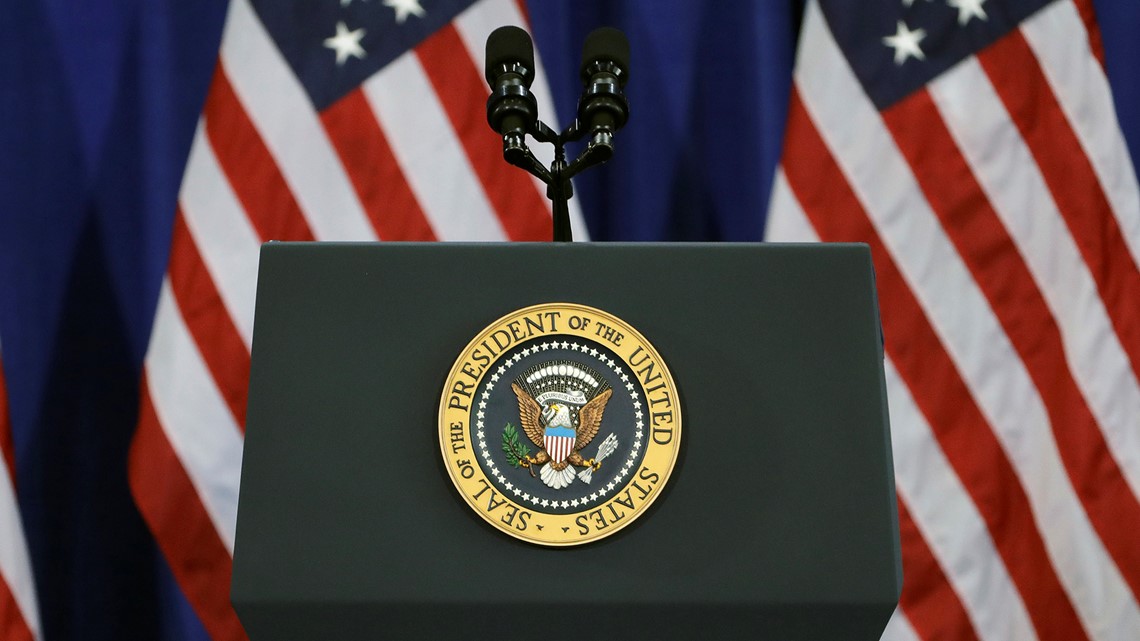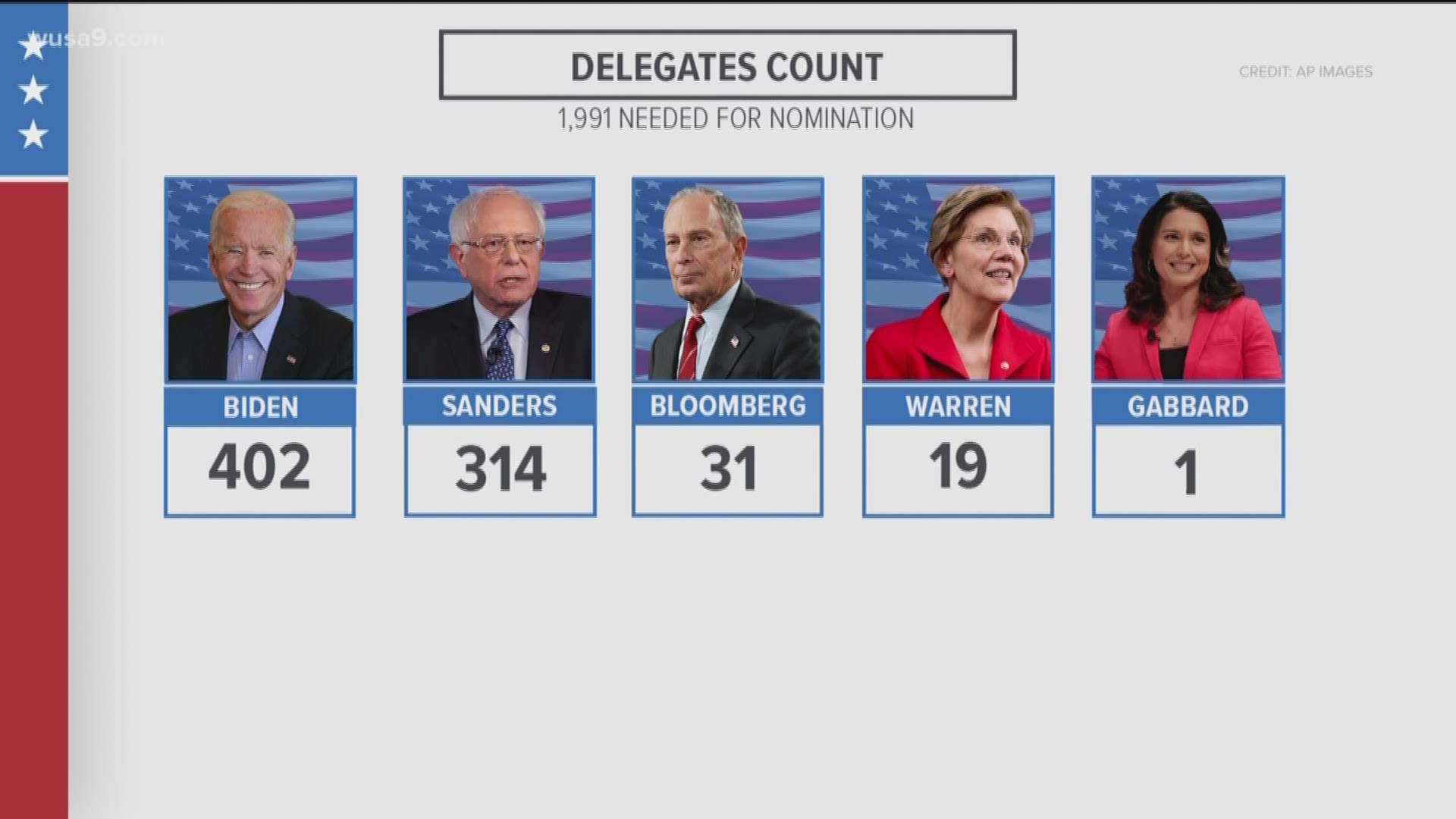WASHINGTON — Four Democrats remain in the race for their party's presidential nomination to take on President Donald Trump in 2020. But Trump is also facing a challenge from within his own party, something which is not unprecedented for a sitting president but has succeeded only once.
Here is a look at who is still in the running and the large field that has already dropped out.
Who is running?
The president launched his reelection campaign on the day of his inauguration. While Trump has high popularity among Republicans and was given his highest approval rating yet from Gallup in early February, he has yet to break an average 50 percent overall approval rating in most polls.
This is Biden's third run for the presidency. He was elected to seven terms in the U.S. Senate before serving as Barack Obama's vice president. Biden has said he would campaign as an "Obama-Biden Democrat," who is as pragmatic as he is progressive.
Gabbard is a major in the U.S. Army National Guard and is calling for an end to regime-change wars. She faces controversy over previously held anti-gay views but says she is now an LGBT supporter.
Sanders finished second to Hillary Clinton for the Democratic nomination in 2016. Despite running as a Democrat, Sanders has labeled himself as an independent throughout his political career. He's campaigning on getting money out of politics, Medicare For All and battling climate change.
Warren is an expert on bankruptcy law and is known for her advocacy of protections for consumers. Has proposed a wealth tax and a massive program to forgive student loan debt.
The self-described Reagan Republican has called on President Trump to resign since the release of Robert Mueller's report into the 2016 election. But, some state Republican parties are canceling their primaries and giving their delegates to Trump, so Weld's chances of taking the nomination away are virtually nonexistent.
Who has dropped out?
Bennet is a former head of Denver Public Schools who has carved out a reputation as a policy-oriented moderate. He's pushed back on the single-payer health care and instead proposes letting consumers buy into Medicare through insurance exchanges. Bennet dropped out on Feb. 11 after failing to win any delegates in the first two contests.
The former New York City mayor and one of the world’s richest men jumped into the field late in November 2019 and officially exited the race on the day after Super Tuesday. Bloomberg didn't accept a single political donation and spent more than $500 million of his own fortune over the course of 101 days in a quixotic bid for the presidency that ultimately collapsed. Bloomberg won just one U.S. territory, American Samoa, in the slate of Super Tuesday primaries, and none of the 14 states where he'd invested heavily.
Booker is a former mayor of Newark, New Jersey. Known for answering residents' call for help during a snowstorm by shoveling snow himself and directing plows, and starting a nonprofit to help residents transform their neighborhoods. He suspended his campaign on Jan. 13.
Bullock won re-election as governor in 2016 in a state that Trump won by 21 points. Signed a law requiring anonymous groups to report campaign contributions in state elections. He suspended his campaign on Dec. 2.
Buttigieg was elected mayor of South Bend, Indiana, at the age of 29. He's a lieutenant in the Navy Reserve and served a tour in Afghanistan. He could become the first openly gay presidential nominee from a major political party. After strong showings in Iowa and New Hampshire, Buttigieg dropped out on March 1 following disappointing finishes in Nevada and South Carolina.
The former San Antonio mayor and U.S. Housing and Urban Development secretary was the first Latino to give the keynote address at the Democratic National Convention. He dropped out on Jan. 2, 2020.
As mayor, de Blasio sought reform of the city’s “stop and frisk” policy and pushed for more affordable housing. He supported paying for universal pre-kindergarten by taxing those making over $500,000 a year. He announced he was ending his campaign Sept. 20, 2019.
The former U.S. congressman from Maryland chose not to run for re-election in 2018 so that he could focus on running for the White House. Known for willingness to work with Republicans while in Congress. Delaney dropped out on Jan. 31 after more than two years campaigning.
Over the past decade, some of Gillibrand's policy positions have shifted from conservative to more liberal as she moved from being a representative in a more conservative district to a senator for all of New York state. She dropped out on Aug. 28, 2019, after failing to qualify for the third debate.
Gravel didn't want to win the nomination. The former two-term U.S. Senator from Alaska said he just wanted to make it to the debate stage to push the platform to the left. He didn't qualify for either of the first two debates. He ended his campaign on Aug. 6, 2019, and endorsed Bernie Sanders.
Harris, whose father is Jamaican and mother is Indian, announced her candidacy on Martin Luther King Jr. Day. Harris is a former California attorney general in her first term as a U.S. senator. Harris dropped out on Dec, 3, citing financial issues with her campaign.
Hickenlooper served two terms as Colorado's governor which included becoming the one of the first states to make recreational marijuana use legal -- something he disagreed with. Helped Denver eliminate $70 million in debt as mayor. Hickenlooper officially ended his presidential campaign on Aug. 15, 2019 and announced he would run for the U.S. Senate.
Inslee served 15 years in Congress before becoming Washington state governor in 2013. He ran primarily on a platform of combating climate change and creating a green economy. Inslee dropped out of the race on Aug. 21, 2019, indicating he knew he would not win the nomination.
Klobuchar, who graduated magna cum laude from Yale, has touted her ability to reach across the aisle to "get things done." She dropped out of the race on March 2, 2020, just one day before Super Tuesday.
As the son of Jamaican immigrants, the Miramar, Fla., mayor says his story will resonate with voters. Messam said he wants universal health care, student loan forgiveness, infrastructure improvements, and focus education toward a high-tech future. Messam ended his campaign on Nov. 20, 2019.
A veteran of the Iraq war. Despite occasionally differing with some on the most liberal wing of the party, Moulton has staked out familiar policy positions for those seeking the nomination including health care as a right and co-sponsoring the Green New Deal. Moulton ended his campaign on Aug. 23, 2019.
In the 2018 midterms, O'Rourke got within 3 percentage points of upsetting Republican Sen. Ted Cruz in the nation's largest red state — and shattered national fundraising records in the process. O'Rourke announced he was ending his campaign on Nov. 1, 2019.
The West Virginia state senator's campaign lasted two months, ending in January 2019. Ojeda told supporters he could not continue to ask them for donations when it was clear he was getting no traction.
The two-term former governor from Massachusetts' resume includes directing his state to set up its own health care exchange separate from the national Obamacare exchange, and pushing for renewal of the national assault weapons ban. He was a late entry into the presidential race, joining in mid-November 2019. Patrick dropped out on Feb. 12, one day after the New Hampshire primary.
The representative from Ohio has resisted being labeled a political centrist, receiving backing from the National Rifle Association and reversing his past opposition to abortion in favor of abortion rights. He dropped out on Oct. 24, 2019.
Was running for the Republican nomination, but suspended his campaign on Nov. 12. Sanford won three terms for U.S. House in the 1990s, then two four-year terms as governor before the affair marred the end of his second term. He returned to politics a couple of years later and won a special election to his old U.S. House seat in 2013, holding on twice more.
Sestak joined the Democratic field on June 23, three days before the first primary debate. He's a retired three-start Navy admiral and a former two-term congressman from Pennsylvania. Dropped out on Dec. 1 after failing to qualify for any debates.
The billionaire has run an ongoing ad campaign calling for President Donald Trump's impeachment. He entered the race in July 2019, six months after announcing he would not seek the nomination. Steyer dropped out on February 29 after failing to score any delegates in the first four contests.
The California congressman, whose key platform was gun control, ended his campaign on July 8, 2019, after failing to gain traction following his first and only debate.
Walsh is a former Illinois congressman and tea party favorite turned radio talk show host. He has a history of inflammatory statements regarding Muslims and others and was previously supportive of Trump but has since been one of Trump's more vocal critics over racism and bigotry. He dropped out on Feb. 7, 2020.
The spiritual leader, author and activist says on her website that America needs to "address the deep emotional and psychological dynamics within the average citizen that have led to the erosion of our political system." Williams dropped out on Jan. 10, 2020.
An entrepreneur, Yang's primary campaign platform was a Universal Basic Income in which the government would pay $12,000 per year to each citizen over age 18. Yang dropped out on Feb. 11 after failing to win any delegates in the first two contests.
The Associated Press contributed to this report.



